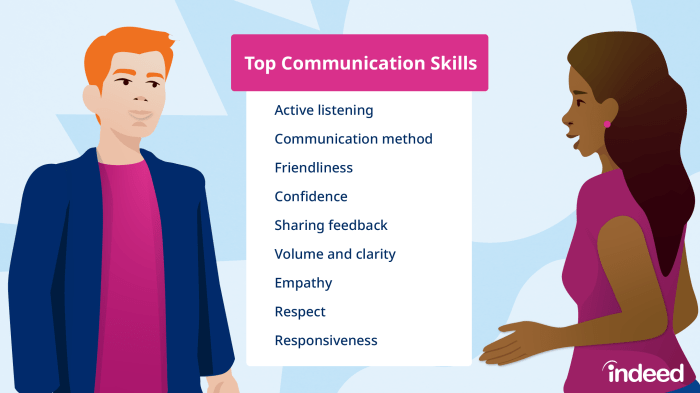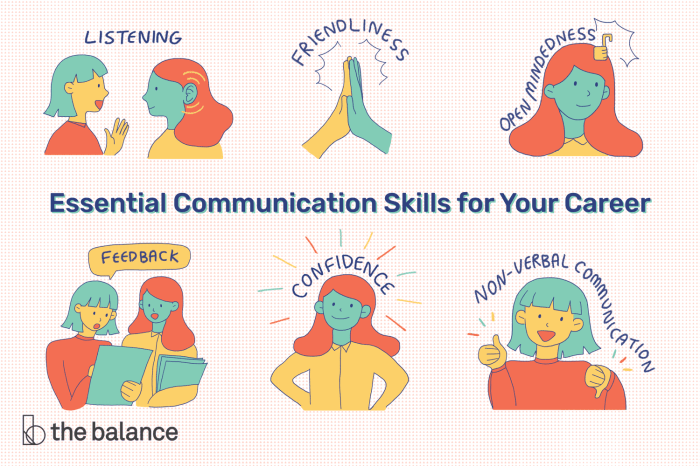Effective Communication Skills are like the keys to the kingdom in both personal and professional realms. Picture this: your words holding the power to build bridges, strengthen bonds, and pave the way to success. Ready to dive in?
Let’s explore the essence of effective communication and unravel the secrets behind connecting with others in a meaningful way.
Importance of Effective Communication Skills

Effective communication skills are crucial in both personal and professional settings as they play a significant role in building strong relationships, fostering collaboration, and achieving success. Whether it’s expressing thoughts and ideas clearly, actively listening to others, or resolving conflicts peacefully, good communication skills are essential for effective interaction.
Positive Impact of Good Communication Skills
Good communication skills can positively impact relationships by promoting understanding, trust, and mutual respect. For example, in personal relationships, clear communication can help avoid misunderstandings and strengthen emotional bonds. In professional settings, effective communication can lead to increased productivity, improved teamwork, and better decision-making processes.
Consequences of Poor Communication Skills
On the other hand, poor communication skills can have detrimental effects in various situations. Misunderstandings, conflicts, and lack of clarity are common consequences of ineffective communication. In personal relationships, poor communication can lead to distrust, resentment, and ultimately, relationship breakdown. In the workplace, it can result in errors, missed deadlines, and a negative work environment.
Key Elements of Effective Communication
Effective communication involves several key elements that are essential for successful interactions. These elements help individuals convey messages clearly and ensure that the intended meaning is accurately understood by the receiver.
Active Listening
Active listening is a crucial element of effective communication. It involves fully concentrating on what is being said, understanding the message, and responding thoughtfully. By actively listening, individuals can show empathy, build trust, and avoid misunderstandings in conversations.
- Engage with the speaker by making eye contact and nodding to show you are paying attention.
- Avoid interrupting and wait for the speaker to finish before responding.
- Reflect on what was said by paraphrasing or summarizing to ensure clarity.
- Show empathy and understanding by acknowledging the speaker’s emotions and perspective.
Non-Verbal Communication, Effective Communication Skills
Non-verbal communication plays a significant role in conveying messages effectively. It includes gestures, facial expressions, body language, and tone of voice, all of which can influence how a message is interpreted by the receiver.
- Pay attention to your body language to ensure it aligns with your verbal message.
- Maintain eye contact to show attentiveness and interest in the conversation.
- Use gestures to emphasize key points and convey emotions.
- Be mindful of your tone of voice, as it can impact the meaning of your words.
Developing Effective Communication Skills
Developing effective communication skills is essential for success in both personal and professional settings. By honing these skills, individuals can build stronger relationships, resolve conflicts, and convey their ideas with clarity and confidence.
Strategies for Developing and Improving Communication Skills
- Practice active listening: Focus on the speaker, ask clarifying questions, and avoid interrupting.
- Seek feedback: Request feedback from others on your communication style and areas for improvement.
- Take communication courses: Enroll in workshops or courses to enhance your communication skills.
- Role-play scenarios: Practice different communication scenarios with a partner to improve your skills.
Tips on How to Communicate Clearly and Concisely
- Avoid jargon and use simple language: Ensure your message is easily understood by all audiences.
- Organize your thoughts: Structure your communication in a logical manner to convey your message effectively.
- Use nonverbal cues: Pay attention to your body language and tone of voice to enhance your message.
The Importance of Empathy and Emotional Intelligence in Effective Communication
Effective communication goes beyond words – it involves understanding the emotions and perspectives of others. Empathy allows individuals to connect on a deeper level and build trust, while emotional intelligence helps regulate emotions and respond appropriately in various situations. By incorporating empathy and emotional intelligence into communication, individuals can foster stronger relationships and resolve conflicts more effectively.
Overcoming Communication Barriers
Effective communication can often be hindered by various barriers that can arise in different contexts. Identifying and overcoming these obstacles is crucial for successful communication in any situation.
Identifying Common Barriers
- Physical Barriers: These include noise, poor lighting, or any environmental factors that can disrupt the message being conveyed.
- Emotional Barriers: Personal emotions, biases, and preconceptions can impact how a message is sent or received.
- Cultural Barriers: Differences in culture, language, or customs can lead to misunderstandings and misinterpretations.
- Perceptual Barriers: Variances in how individuals perceive information can affect communication effectiveness.
Techniques to Overcome Communication Barriers
- Active Listening: Paying full attention to the speaker and seeking clarification when needed can enhance understanding.
- Clear and Concise Communication: Using simple language and avoiding jargon can help in conveying messages effectively.
- Empathy and Understanding: Putting oneself in the other person’s shoes and considering their perspective can facilitate better communication.
- Feedback Mechanisms: Encouraging feedback and ensuring understanding can help in addressing any misunderstandings promptly.
Impact of Cultural Differences
- Cultural Sensitivity: Being aware of cultural norms, values, and practices can aid in navigating communication barriers due to cultural differences.
- Effective Cross-Cultural Communication: Developing intercultural communication skills and being open-minded can foster better interactions across diverse cultural backgrounds.
- Respect and Adaptability: Showing respect for other cultures and adapting communication styles accordingly can bridge gaps caused by cultural differences.
Effective Communication in Different Settings: Effective Communication Skills

Effective communication skills play a crucial role in various settings, including interpersonal, group, and public speaking scenarios. The ability to adapt communication styles based on the audience is essential for successful interactions. Moreover, mastering effective written communication is vital in professional environments to convey information clearly and professionally.
Interpersonal Communication
In interpersonal communication, individuals engage in one-on-one interactions where listening, empathy, and nonverbal cues are key. Effective communication in this setting involves active listening, clear articulation of thoughts, and the ability to express emotions appropriately.
Group Communication
Group communication requires collaboration and coordination among multiple individuals. It is essential to establish clear objectives, encourage active participation from all members, and resolve conflicts constructively. Effective communication in group settings involves effective facilitation, active engagement, and the ability to provide constructive feedback.
Public Speaking
Public speaking involves addressing a larger audience and delivering a message effectively. It is crucial to engage the audience, maintain confidence, and communicate with clarity and conviction. Effective public speaking requires thorough preparation, strong delivery skills, and the ability to connect with the audience.
Adapting Communication Styles
Adapting communication styles based on the audience is essential to ensure the message is received and understood effectively. This involves tailoring the tone, language, and delivery of communication to suit the preferences and expectations of the audience. Whether communicating with peers, superiors, or clients, adjusting communication styles can enhance rapport and foster better relationships.
Strategies for Effective Written Communication
Effective written communication in professional environments involves clarity, conciseness, and professionalism. Strategies such as organizing information logically, using appropriate language and tone, and proofreading for errors can enhance the effectiveness of written communication. Additionally, utilizing tools such as email etiquette and proper formatting can help convey messages clearly and professionally.